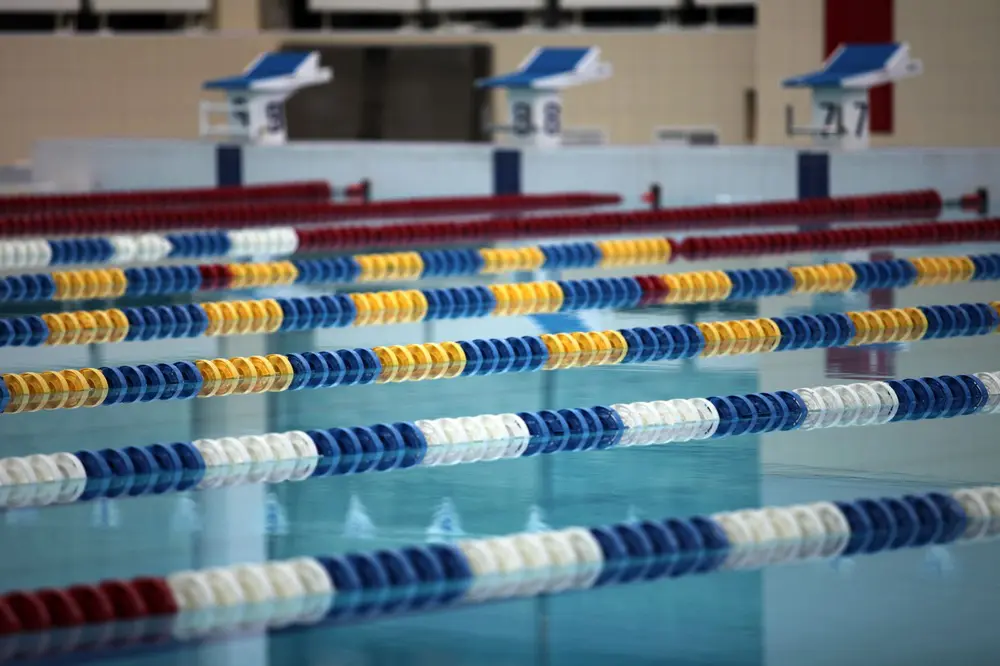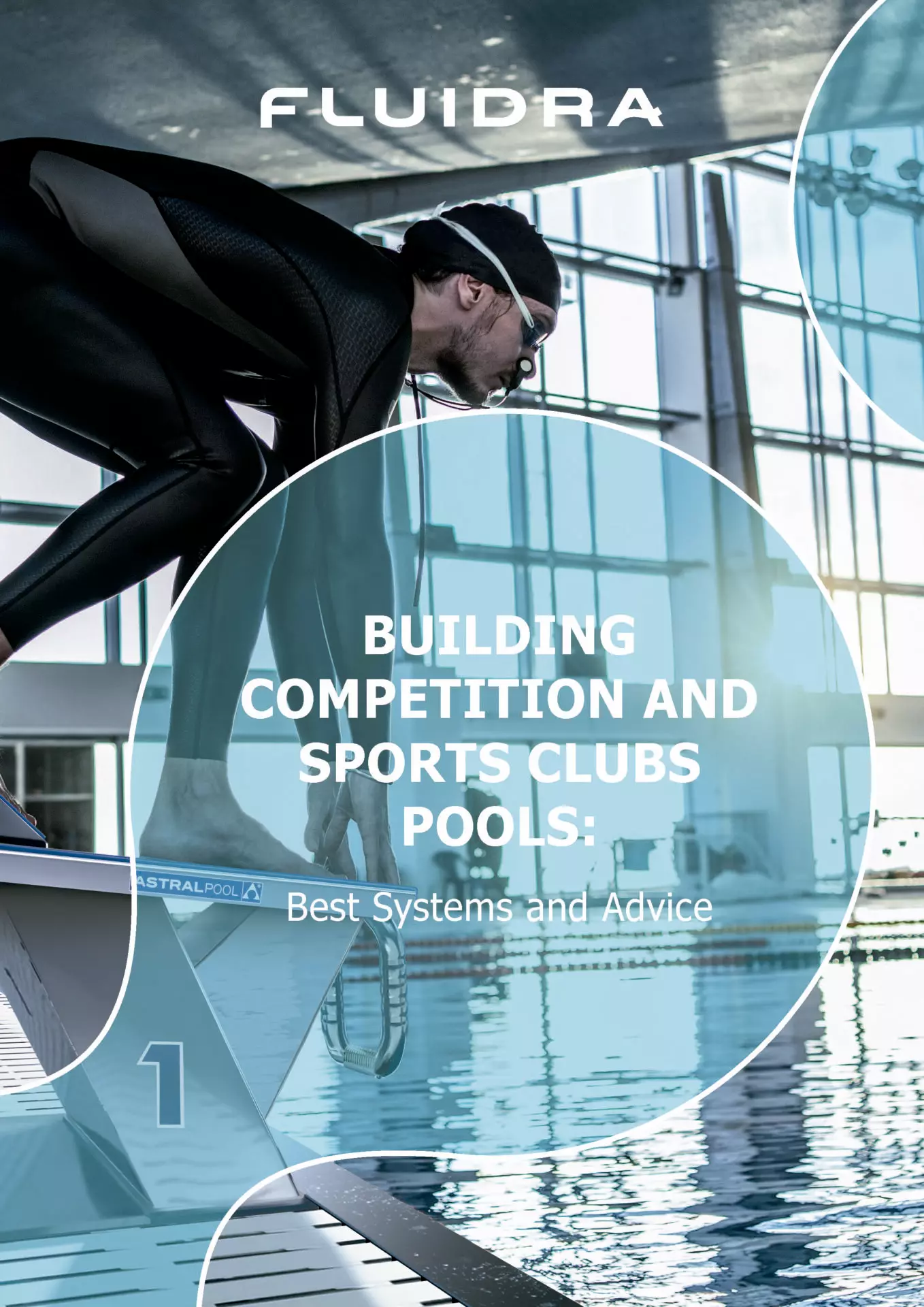
Sport pools are becoming increasingly popular for sport clubs, athletes, and recreational sport enthusiasts. They offer a great way to practise and perfect your skills, as well as perform in and attend sporting events. Sport pools come with many options in terms of building systems, water treatment, and other features that make them enjoyable for everyone involved.
Whether we consider sport pools built for practice or those that are designed to host national or international competitions, pool builders have multiple aspects to consider. Furthermore, pool maintenance and operation requires efficient water treatment and specific accessories that you will need to be aware of.
In this article, we’ll cover:
- The differences between competition and sports club pools;
- The various types of sport pools;
- The best building systems for these pools;
- Optimal water treatment and accessories.
Competition pools are built and maintained to the highest standards to accommodate international sport events. As such, they require a special building system that prioritises safety and performance. They also tend to involve a more precise water treatment budget than other sport pools.
On the other hand, the sport pools found in sports clubs or leisure centres have different – and perhaps less stringent – requirements. While building systems and water treatment may be less restrictive, they should still guarantee maximum performance.
Competition events
Competition pools are no ordinary swimming venues – they must adhere to the World Aquatics Competition Regulations (former FINA Facilities Rules) in order to be certified and make them ready to host official competitions. The dimensions, temperature, lighting parameters as well as any accessories and equipment used are all fine-tuned according to World Aquatics standards. These world class facilities can also support elite athletes with their training goals; a few examples include the Club Natació Sabadell (Spain) or CAR Sant Cugat (also Spain).
Depending on the sports discipline they host (swimming, artistic swimming, water polo, diving or high-diving) they must comply with the corresponding rules and regulations for each type of event.
Sports clubs
While these pools are not intended for use in official competitions, they are no less important. They do not need to obtain a World Aquatics certification. Most often, especially in the case of lap pools, these are used predominantly by gym members to train or swim recreationally . They can also be used by children learning to swim, for leisure purposes, and for rehabilitation by athletes doing activities such as aquagym, for example.
Sport centres and athletic facilities that wish to have certified pools for sporting events must adhere to the organisation’s strict guidelines. Depending on the type of sport it’s designed for, different parameters will need to be followed.
Olympic pools
This is the largest type of swimming pool for competitive events (50m in length). It is most often used for international and official swimming competitions and events. At the same time, some sports clubs also have Olympic swimming pools open for training.
Semi-Olympic pools
At 25 metres long, semi-Olympic pools are often found in sports clubs, leisure centres and gyms, as well as in competitive venues.
Diving pools
Diving pools are designed for training and competition in jumping, trampoline and platform dives. They are normally housed in large sports complexes due to the sheer size and height required for the diving platforms. Sports clubs may also have them if they aim to offer training for professional athletes.
Diving pools are more complex from a maintenance and security point of view, as multiple requirements aiming to ensure the safety of divers need to be observed.
High-diving pools
High diving is closely related to the discipline of platform diving, with two basic differences. In high-diving competitions, athletes land feet first, after they jump from an additional height (World Aquatics establishes heights of 20 metres for women and 27 metres for men). High diving can be performed from a cliff or artificial platform into the sea, a lake, a river or an artificial pool.
Water polo pools
Another very specific type of sport pool, these are designed for playing water polo. They must allow swimmers to never touch the bottom of the pool – i.e., floating at all times. It is, however, common to have water polo competitions in Olympic swimming pools where ropes are used to create the standard dimensions of a playing field and the required competition accessories are added.
Artistic swimming pools
Artistic or synchronised swimming is an individual or collective competition that takes place in 30 x 20 m competition pools no less than 3 metres deep.
Warm-up pools
A warm-up pool is specifically designed for competitive training sessions before or during a competition. As such, they may include competition accessories, complying with the same World Aquatics regulations as Olympic or semi-Olympic swimming pools.
Lap pools
Commonly designed in a rectangular shape, lap pools are meant for recreational swimming as well as training, swimming lessons and general sports club activities. They are not subject to WA rules. Each lap pool can have its own specifications, but they have to comply with official standards in line with regional regulations in terms of public use.
For more information about these pool regulations, you can consult World Aquatics Competition Regulations.

In order to offer a high-performance environment while complying with the relevant regulations, the best approach for building competition pools and sports club pools alike is a modular panel system. Below, we’ll introduce two such effective and reliable solutions.
Skypool
The Skypool panel system works very well for both permanent and temporary pools. It complies with the World Aquatics standards thanks to its high levels of accuracy, safety and reliability. Skypool panels have an easy anchoring and assembly system, leading to complete water tightness when in place. The panels are made from hot-dipped galvanised steel which also adds antioxidant protection and a longer durability.
Skypool panels are lightweight and easy to install relatively quickly. This contributes to cost-savings for pool managers, but also makes them easy to transport to other official events for subsequent use as required.
Bluespring
This second type of building system has a modular structure using prefabricated panels. We especially recommend these for sports club pools. They are high quality and durable, and provide a stylish design. The lightweight structure further allows Bluespring panels to be adapted to the type of pool they’ll be used in. They easily fit into small space-for example, on a hotel rooftop.
Finally, the Bluespring system has a double-walled perimetral self-supporting structure (external and internal panels), with an overflow channel and a built-in compensation tank.
When operating a sports pool for competition or within a sports or leisure club, the quality of the water is of paramount importance. To ensure health and comfort, water quality must be monitored effectively. Additionally, pool operators should be able to act on it efficiently and easily. Competition pools have parameters set by World Aquatics federation which must also be followed. For example, for World Championship swimming events, records will only be accepted if they are set in water with a concentration of less than 3 grams of salt per litre.
To optimise your water quality management, we recommend systems that feature UV electrolysis equipment, such as Freepool 2 and Neolysis.
These systems correct pH levels by injecting CO2 through the same reactor instead of acid, thus reducing water consumption. This also lowers the amount of harmful compounds that can be derived from mixing with organic substances. The result is water that is healthier and more comfortable for users, as the system will reduce skin irritation, eye itching, strong odours, etc.
Freepool2 and Neolysis treatment systems are also beneficial to the environment by reducing gas emissions, avoiding the use of chemical chlorine and drastically reducing the concentration of chloramines due to ultraviolet radiation.
For pools set up temporarily at competition events, we also recommend the Nefrona solution. This is a compact water treatment solution, easy to move, and a plug-and-play concept. It was developed by AstralPool and especially designed for temporary events. Nefrona includes disinfection, filtration and pumps for the recirculation system in the same monobloc, obtaining excellent water quality. The filtering unit is mounted on a hot-dipped galvanised steel bed plate to prevent corrosion. Additionally, all models can be supplied with heating and microfiltration functions using diatomaceous earth.

Once the pools have been built and appropriate water treatment systems are in place, the use of such sports pools for competitions will require them to also feature very specific accessories. Some of these also apply to sports centres and gyms.
Liner, coping and pool deck
Increasing the waterproofing of the pool using a reinforced PVC-P liner is a great idea. Made of plasticised polyvinyl chloride, this is the most commonly used system for covering pools as it is extremely flexible, resistant to tearing, easy to weld and resistant to bleaching from UV rays.
For ornamental and coping finishes, porcelain stoneware enhances a pool’s design and embellishes its finishing. Tiles and porcelain stoneware are chosen for Skypool pools in particular, because of the quality of materials, the exclusive designs and their proven track record of performance in pool environments.
Finally, to give the pool a walkable surrounding area, you must install a pool deck. This is also the place where swimmers will prepare to dive into the pool, so anti-slip materials must be considered.
Competition accessories
Depending on the sport and type of event involved, you will need to add a number of competition pool accessories. A well-designed pool makes it easy to add these on safely into the panel construction system already in place.
Some accessories for swimming competitions include false-start ropes, starting blocks, lane ropes and floats, podium platforms, indicators for backstroke turns, timing systems, anchors and turning panels.
Movable bulkheads and movable floors are some additional innovative pool accessories that help multiply the potential uses of a single sports venue, offering the opportunity to change the size and shape of the swimming pool area.
In the case of diving pools, spargers are needed for training sessions. These help soften the diver’s landing into the water surface by releasing air bubbles from the bottom of the pool (an aeration system).
Finally, for water polo games, you may also need lane ropes to delimitate the playing field, as well as water polo goals and ball holders.
Lighting
Swimmers need adequate lighting to measure distances and locate the pool walls and floor in order to safely swim, dive or participate in other activities. Therefore, proper pool lighting is essential in competitions, but also for sports clubs installations.
According to the latest EU eco-design regulations, halogen swimming pool lights can no longer be sold in the European market, so LED lighting stands out as the ultimate lighting solution for swimming pools thanks to its efficiency, adaptability and sustainability.
Installing and operating sports pools correctly and safely can be tricky without taking into account all the relevant regulations – especially for competition pools where World Aquatics requirements must be met. With this introductory guide, you now know the minimum requirements for sport pools in competitions and for sports clubs, as well as some key elements to consider when operating these pools.
